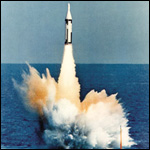Tehran’s attacks are reshaping the security situation in the Middle East—and forcing the region’s clock to tick backward once again.
Amr Hamzawy

Source: Getty
James M. Acton, Pierre Goldschmidt, and George Perkovich argue that the position taken by Senator Jon Kyl and Richard Perle on US nuclear weapons policy is to be welcome as a stimulus to analysis and debate, but relies on a series of invalid premises.
President Obama’s speech on April 5, 2009, in Prague, in which he pledged “America's commitment to seek the peace and security of a world without nuclear weapons,” was the most important statement of nuclear weapons policy in a generation. It is absolutely right to subject this policy to scrutiny. The critique by Senator Jon Kyl and Richard Perle in the Wall Street Journal last week is to be welcomed as a stimulus to analysis and debate.
The Kyl and Perle op-ed is, however, based on a series of invalid premises. It focuses on arguments not actually made by those who advocate the vision of a world free of nuclear weapons. It divides states into US allies and US enemies, thus ignoring the majority that are neither, while also overlooking the different perspectives of many US allies and friends. The article’s reading of expert opinion—particularly scientific opinion—is highly selective.
Senator Kyl and Mr. Perle repeat the over-worn line that it is naïve to expect determined proliferators to halt their pursuit of nuclear weapons in response to disarmament efforts by the US and others. We agree. And so, contrary to their assertion, does the Obama administration and its advisers.
Former Senator Sam Nunn, for instance, recently restated his reasons for supporting the goal of abolition in partnership with Henry Kissinger, George Shultz, and William Perry (who, incidentally, Senator Kyl and Mr. Perle happily cite when it suits them):
The four of us are not saying that if Russia and the United States set a shining example that Iran and North Korea will suddenly see the light and immediately abandon their nuclear programs. That is not our point.
But we do believe that if we take this path, many more nations are likely to join us in a tough approach to prevent the proliferation of nuclear weapons and materials and prevent catastrophic terrorism.
The US frequently finds itself trying to motivate large numbers of other states to agree to tighten nonproliferation rules and their enforcement, including through sanctions and possible interdiction efforts. Experience shows that many states express unwillingness to do so when the US and other strong nuclear powers appear determined to retain their own nuclear arsenals for the indefinite future. For example, the United States’ strategy for dealing with Iran’s nuclear program has foundered, in part, on the refusal by the Non-Aligned Movement to isolate Iran politically because of frustrations with the United States’ lack of progress in meeting its disarmament commitments.
Moreover, if the US—the world’s strongest conventional power—bases its security on nuclear weapons indefinitely and eschews any program of action to work towards their elimination, how is it possible to persuade much more vulnerable states that they do not need nuclear weapons to defend their national integrity?
US ratification of the Comprehensive Test Ban Treaty (CTBT) is a touchstone of its commitment to work towards the abolition of nuclear weapons, as every American administration in the nuclear age has recognized, except that of George W. Bush. Senator Kyl and Mr. Perle claim the treaty “simply is not verifiable.” In doing so they are selectively ignoring the overwhelming majority of scientific expertise, the pleas of the allies about whom they profess so much concern, and a substantial number of the experts who served on the Perry-Schlesinger Commission.
Mr. Perle hardly has an impressive record on this score. In the 1980s, using evidence that was at best ambiguous, he regularly asserted that an agreement to ban nuclear tests over 150 kT, the Threshold Test Ban Treaty, was being repeatedly violated by the Soviet Union—a claim now definitively proven to be wrong. When a government-sponsored study argued that seismology—which undermined his claims—was the most accurate method for assessing the yield of nuclear tests, then Assistant Secretary of Defense Perle made the telling admission that “I didn’t particularly care much what their answer was. It doesn’t have any profound bearing on our policy.”
If verification really is the key issue for Senator Kyl and Mr. Perle then they should clearly lay out why the vast majority of independent expert opinion is wrong. If, however, they once again “don’t particularly care” about the technical details of verification then they should honestly explain their real opposition to the treaty.
It is remarkable that in June 2009, Indonesia, a key non-aligned country and one of the nine states (with China, Egypt, India, Iran, Israel, North Korea, Pakistan, and the US) that must ratify the CTBT for it to come into force, pledged to ratify the treaty as soon as the US does. For any party to the Nuclear Non-Proliferation Treaty (NPT) to delay or obstruct the entry into force of the CTBT is incompatible not only with the spirit of the original nonproliferation bargain, but also with the explicit conditions by which the NPT was indefinitely extended in 1995.
Senator Kyl and Mr. Perle paint a picture of a nuclear-weapons infrastructure in crisis. While we—and, more importantly, President Obama—share their aim of maintaining a safe, secure, and reliable nuclear arsenal for as long as nuclear weapons exist, there is room for disagreement about whether an urgent modernization program is required. Science-based "stockpile stewardship" has been effective to date at ensuring the viability of existing US nuclear weapons. What is needed is an unhurried and sober analysis of exactly what is required to ensure that the US nuclear arsenal remains safe and reliable—exactly what the Obama administration is doing.
This analysis must take into account the effects on other states of a decision by the US to modernize its nuclear arsenal. Too many people, especially those connected with the American defense establishment, seem to ignore the vast majority of states that are neither close allies nor sworn adversaries of the US. These states vehemently reject the discriminatory nature of the nonproliferation regime and are urging the US and other nuclear-armed states to live up to their commitments to work towards disarmament.
Even when it comes to US adversaries, Senator Kyl and Mr. Perle overstate their case. They state that “a robust American nuclear force is an essential discouragement to nuclear proliferators.” Yet, the United States’ huge nuclear arsenal failed to deter North Korea’s and Iran’s nuclear programs and has done nothing to help it resolve these crises.
President Obama stated this week in Moscow that it is essential for the US to lead the world by example. He correctly believes that if there is to be the required international support for a much-needed strengthening of the nonproliferation regime the US must take its disarmament commitments seriously. Ratification of the CTBT before the 2010 NPT Review Conference should be a top priority.
James M. Acton and George Perkovich are, respectively, associate and director in the Nonproliferation Program at the Carnegie Endowment for International Peace and co-editors of Abolishing Nuclear Weapons: A Debate. Pierre Goldschmidt is nonresident senior associate at the Carnegie Endowment for International Peace, and former deputy director general of the International Atomic Energy Agency, head of the department of safeguards.

Jessica T. Mathews Chair, Co-director, Nuclear Policy Program
Acton holds the Jessica T. Mathews Chair and is co-director of the Nuclear Policy Program at the Carnegie Endowment for International Peace.

Former Nonresident Senior Associate, Nuclear Policy Program
Goldschmidt was a nonresident senior associate at the Carnegie Endowment.

Japan Chair for a World Without Nuclear Weapons, Senior Fellow
George Perkovich is the Japan Chair for a World Without Nuclear Weapons and a senior fellow in the Carnegie Endowment for International Peace’s Nuclear Policy Program. He works primarily on nuclear deterrence, nonproliferation, and disarmament issues, and is leading a study on nuclear signaling in the 21st century.
Carnegie does not take institutional positions on public policy issues; the views represented herein are those of the author(s) and do not necessarily reflect the views of Carnegie, its staff, or its trustees.
Tehran’s attacks are reshaping the security situation in the Middle East—and forcing the region’s clock to tick backward once again.

Amr Hamzawy
Only collective security can protect fragile economic models.

Andrew Leber
Europe’s reaction to the war in Iran has been disunited and meek, a far cry from its previously leading role in diplomacy with Tehran. To avoid being condemned to the sidelines while escalation continues, Brussels needs to stand up for international law.

Pierre Vimont
In 2021, the U.S. government began to consider how to address climate migration. The outcomes of that process offer useful takeaways for other governments.

Jennifer DeCesaro
On the last day of the India AI Impact Summit, India signed Pax Silica, a U.S.-led declaration seemingly focused on semiconductors. While India’s accession to the same was not entirely unforeseen, becoming a signatory nation this quickly was not on the cards either.

Konark Bhandari